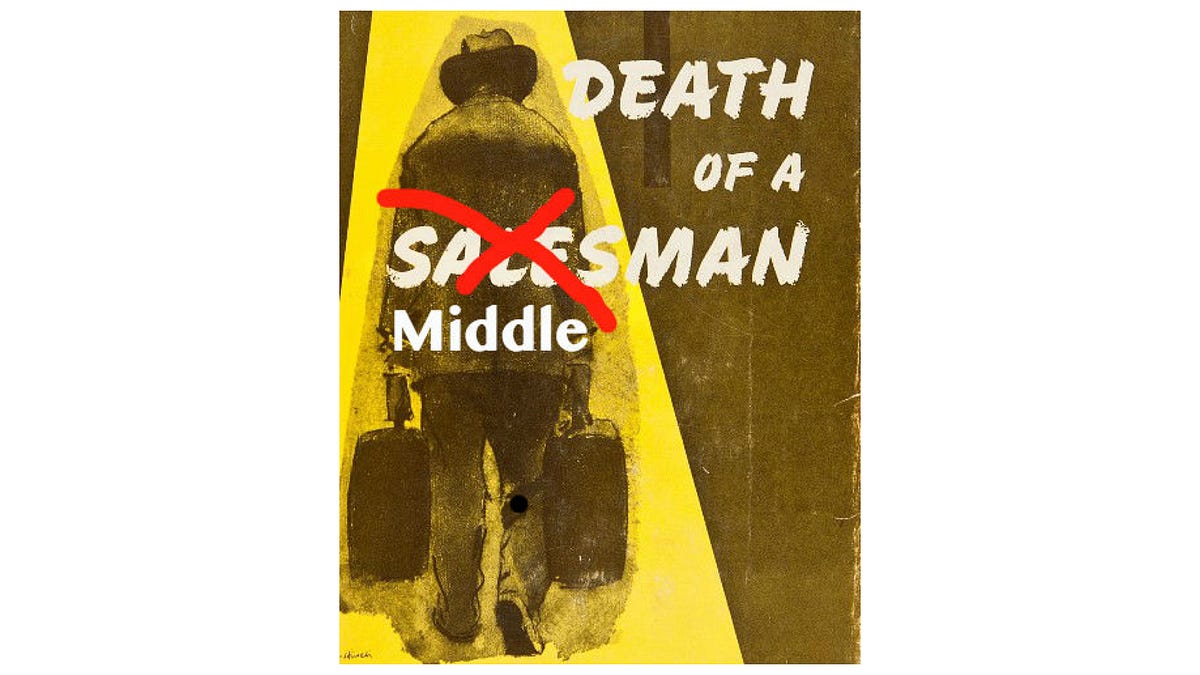
“For it is mutual trust, even more than mutual interest that holds human associations together. Our friends seldom profit us but they make us feel safe.” — H. L. Mencken
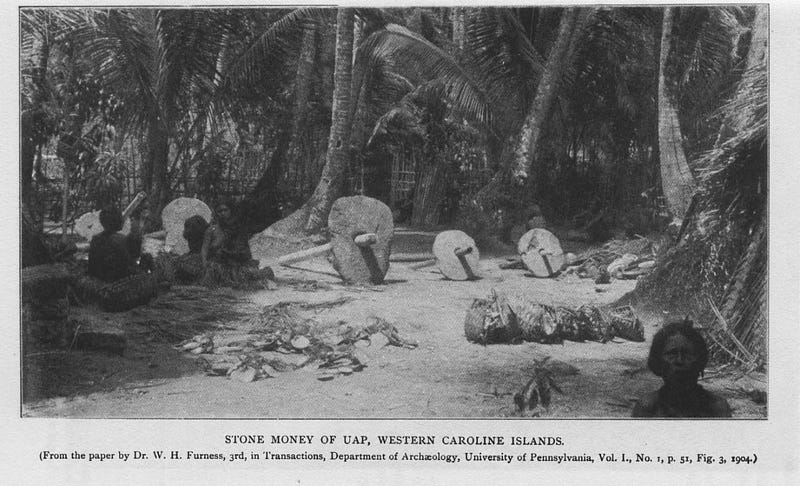
The Pacific Island of Yap is known for its stone money, known as Rai. Rai stones are large doughnut-shaped, carved disks of calcite, up to 12 feet in diameter. The stones became legal tender and were even mandatory for the payment and settlement of large transactions. Expeditions to obtain Rai and regulation of their use was controlled by local Chieftains.
The stones were too big to carry around and there was no such thing as a middleman to monitor their use and track their ownership.
Ownership of Rai stones was recorded orally. Just as folklore was passed from generation to generation to preserve history, Rai stone ownership was recorded orally by the community. As Dominic Frisby told us on this innovation show. “Tony owns the one down by the beach”, was record enough, importantly transparency was ensured by the entire community knowing who owned what.
The important elements here were, the record was decentralised and distributed across the community. The distribution of the record across the community ensured no middleman kept a central record. Trust was paramount.
When you are Global is it possible to act Local?
As a child, my first lessons in transactions and “how shops work” was watching the shop scenes in ‘Little House on the Prairie’.
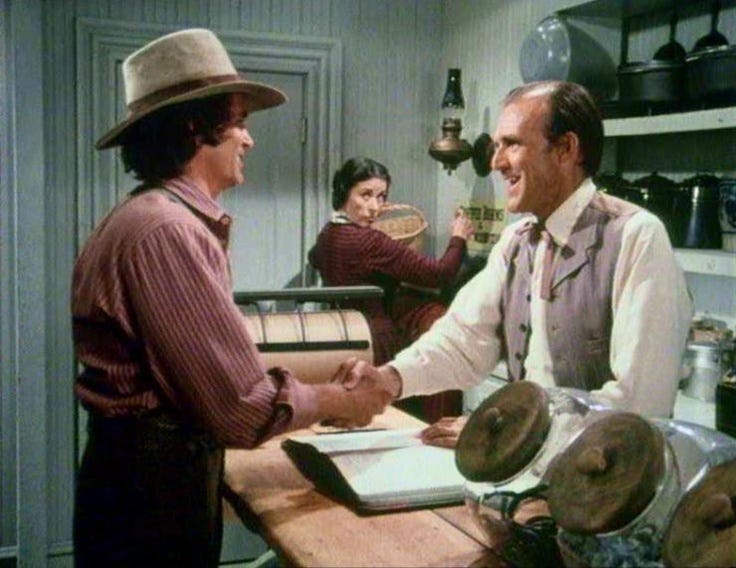
These visual lessons, coupled with growing up in a small village taught me that everyone knew their local shopkeeper, bread man, milk man, post officer owner and for the older ones, their publican.
The common denominator across all these brokers was that trust was inherent. If they broke this trust, it would seriously damage their reputation. In a small village, when you were part of a tribe, being accepted and belonging to that tribe was essential. If word got out that you were underhanded in any way it would seriously damage your business, it would seriously damage your trust.
The world became more and more industrialised and the local shop, the milkman and the bread man gave way to the supermarket, the paperboy gave way to the internet and the local credit union gave way to the bank. In this world, we had to put our trust in someone we did not know.
Along came the Internet and the advent of e-commerce. We start buying from strangers. We need a middleman to ensure we are not ripped off. In the early days, as you would imagine, many people were.
In this new world, we had no trust in someone we did not know, we had to rely on their ratings and reviews, we had to rely on the middleman to ensure we would not lose out.
Amazon was quick to realise that they were not just a marketplace, but they were a trusted middleman. They were a “trust marketplace”. Amazon’s customer care is second only to Zappos, a company I am sure Amazon acquired not just for their business model, but for their mental model.
As long as your data set shows you to be a loyal and trustworthy customer and perhaps even when you are not Amazon will refund you if there is an issue. Even when FedEx or whatever other postal service lets Amazon down, Amazon take responsibility, they do not blame the third party, they fix it for the customer.
Despite the excellent example of Amazon, the digitisation of the business world, coupled with mass connectivity meant that no business could really compete by just being local anymore. The ones that do realise that they need to focus on experience, they need to focus on business as theatre if they are to compete. However, for any business with a me-too product they need to be Global, but is it possible to act local when you are Global?
The challenge with Global business is that trust is essential, any sales professional selling a product or service with a hefty price tag knows that they are selling themselves, they are selling trust. This is why an authentic online presence is important, this is why a completed Linkedin profile is important. If a sales professional reaches out to a potential client, the first thing that client will do is an online search for you and your company. If you or your company have created any content of value, the potential client will be more likely to meet you. Trust is first built virtually and then completed physically and then by the fulfilment of your product or service.
The Broken Seiyaku
Seiyaku — The Japanese word for ‘vow’ or ‘oath’; an earnest and solemn promise we promise never to break.
Most double-sided platforms and most marketplaces are built on trust. These businesses are in the trust business first and foremost.
For banks, this is why the financial collapse was so damaging. It wasn’t that people made “mistakes”, it was a collapse of trust.
For charities, this is why the financial scandals were so damaging. It wasn’t that people made “mistakes”, it was a collapse of trust.
For the luxury industry, this is why The Blockchain offers such an opportunity, it guarantees the authenticity of goods.
As humans, we find ways to lower uncertainty about one another so we can exchange value (products or services). This is why the idea of institutions (as middlemen) to lower uncertainty was introduced.
When we were more tribal and needed the tribe to survive, we would never betray trust. Society was communal, so if you betrayed the trust of the tribe and they threw you out, you would most likely die.
When society introduced the concept of competing for gain, for status and for recognition, so did society introduce the demise of trust.
The Trust Protocol — Blockchain
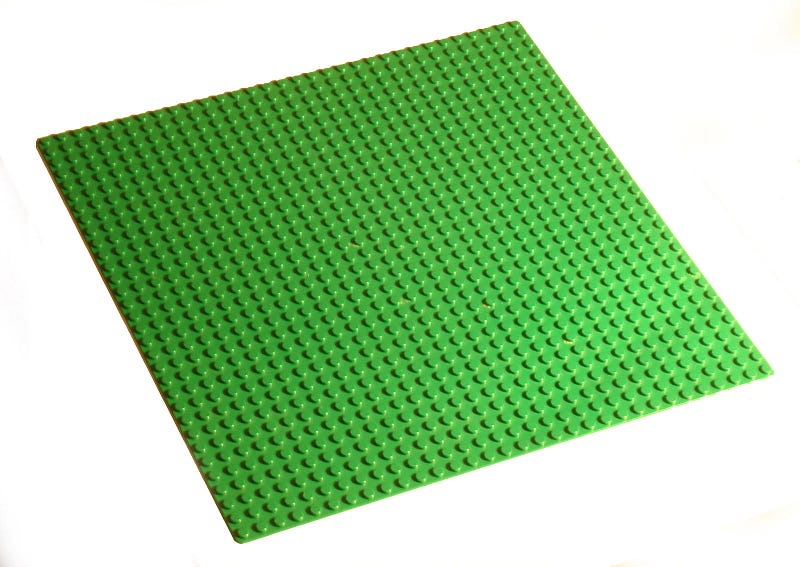
Considering everything we discussed above, imagine a platform existing on which everything else could fit (IoT, Ai, Data etc.). Imagine this as a green lego baseplate. Imagine the baseplate as the Blockchain.
Recent guest on the innovation show, Vince Meens says this lego base gives context to everything that sits atop it. It also ensures trust and transparency, a distributed ledger, just like with the people of Rai, except this time with decentralised computers of the world, ensuring unbiased, decentralised and transparent capture of all transactions.
As the great Don Tapscott, a recent guest on the show says of the Blockchain, trust is built into the system, it is inherent through cryptography and collaboration. If trust is built into the system and the idea of institutions (as middlemen) was introduced to lower uncertainty and establish trust, then what happens the institutions when they are no longer needed?
Disintermediation and The Death of the Middleman?
Disintermediation is defined as the reduction in the use of intermediaries between producers and consumers.
The World Economic Forum predicts robots will replace 5 million jobs by 2020. These jobs will be replaced by artificial intelligence and automation.
However, in some cases, it won’t be the technology directly replacing people. It will be technology replacing what some people represent. If a middleman is a broker of trust, that broker will be replaced in the future by a combination of cryptography, technology, code and global collaboration.
When the Blockchain goes mainstream, we will still need human mediators to handle disputes if/when they arise, but in the meantime, we will be seeing a version of the following:
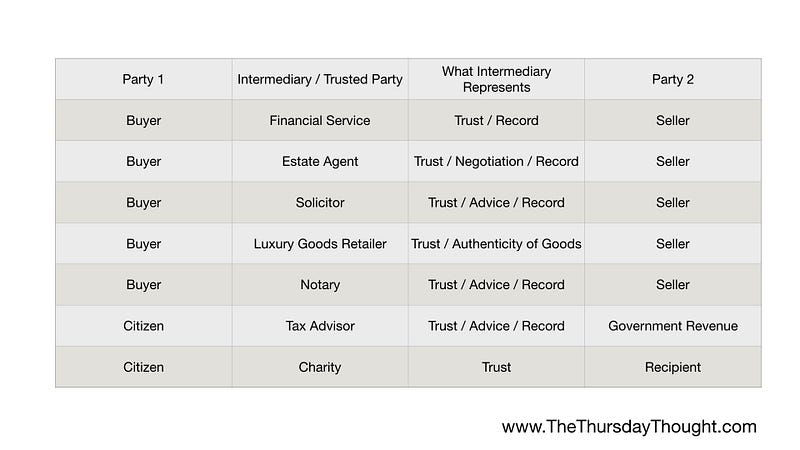
Becomes
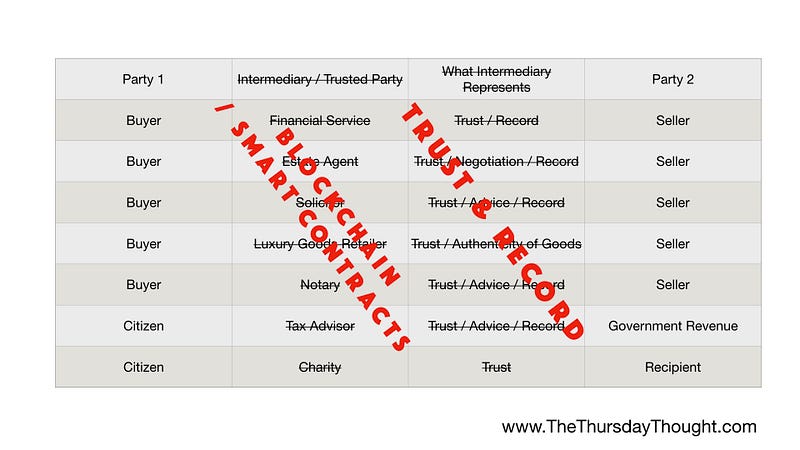
Bitcoin Is a Signal
The person or persons Satoshi Nakamoto wrote the whitepaper that signalled a new type of money just after the financial collapse. This was a final straw that broke the camel’s back, a response to the betrayal of financial institutions.
Many organisations and authorities with vested interests are doing what they always do when they are threatened. Just like the pharmaceutical industry ridicules the homoeopathic industry — because it is a threat — financial institutions are doing the same with digital currencies. Bitcoin has even been labelled a fraud by the CEO of JP Morgan, meanwhile, you can be sure JP Morgan has hedged their bets and invested in it.
Ultimately, whether Bitcoin makes it or not, what we need to really understand as a business community is what it really means. Bitcoin and the Blockchain are a signal. They are a signal that trust has been broken and that the people want change.
When that happens it can be difficult to stop.
“Trust is the one thing that changes everything.” — Stephen M.R. Covey
On the Innovation show this week we have a triple special on The Blockchain potential:
Don Tapscott a leading Global authority on the impact of technology on business and society. He has authored over 15 books, including Wikinomics, The Digital Economy, Digital Capital, Growing up Digital, the Naked Corporation, Radical Openness and Blockchain Revolution We talk a little about Don and his ethos and how he has overcome adversity to change over the years and we look at the revolutionary potential of The Blockchain.
Nathan Waters is the founder of Peerism, a blockchain-based economic protocol which aims to solve job automation and wealth inequality via skill tokens, proof-of-skill and matching paid work to tokenized skill levels. He is a futurist, entrepreneur and social decentralist. He also founded and organises one of the largest Ethereum meetups in the world SydEthereum and the largest independent hackathon in Australia Hackagong.
Blockchain Evangelist Vince Meens tells us how Blockchain will act like a canvas to connect the World, like a giant brain. We discuss the many benefits of a connected World built on this new technology. Vince gives us a plethora of fantastic examples where we will see Blockchain realise its potential. We discuss the blockers to adoption, some possible routes of how to begin. We discuss accountability, transparency and trust and how the World of business will dramatically change. Fascinating listen, worth the time investment.
As always, the show is broadcast on RTÉ Radio 1 extra 3 times weekly and is on iTunes, TuneIn Stitcher Player FM and Google play. The website is here.